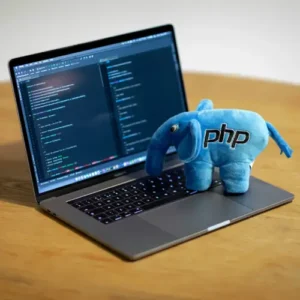A prominent open-source programming language for web applications is PHP. PHP is now an acronym for “hypertext preprocessor,” even though it initially stood for “personal home page”; nonetheless, it’s unlikely that you’ll ever hear that term again. PHP is an HTML-embedded server-side scripting language in its most basic form. PHP enables database interaction and dynamic content creation for web developers. The advantages of PHP’s simplicity, speed, and adaptability have helped it become a mainstay in the online web development industry.
People utilize 79.1% of all websites having known server-side programming, up from 72% in 2010, and its usage has increased over the past ten years. Some of the biggest websites and platforms, like Facebook, Wikipedia, WordPress, and Zoom, employ PHP.
PHP: An Overview
PHP is essentially the tool you use to connect to your database, collect information from it, and then send that information to your web server to display in HTML, just like any other scripting language. However, PHP differs from other languages in a number of ways.
PHP is, in a nutshell:
- A Scripting Language: Runtime interpretation of scripts is performed by another software (no need for compilation). Server-side or client-side interpretation is available for scripting languages (in the browser).
- PHP is a server-side scripting language that process on a web server by a PHP interpreter; the finished product (the output) then provide to the web browser as plain HTML.
- Open-Source – PHP can downloade and used without charge.
- Object-Oriented – Object-Oriented Programming (OOP) makes use of the idea of “objects” to hold data and functions in order to aid in the development of more intricate, reusable online applications. To PHP5, OOP was added.
- Fast – PHP uses its own memory, reducing the strain on the server and enhancing performance. Compared to Python and Ruby, PHP can be up to 382% faster.
- Simple – Whether you’re constructing from scratch or utilizing pre-existing frameworks or add-ons, the PHP syntax is simple to understand and learn.
- Well Supported – PHP is well-supported by all major databases (MySQL, SQLite, ODBC), most servers (Apache, IIS, etc.), all platforms (Windows, macOS, Linux, etc.), PHP frameworks (Laravel, CodeIgniter, Symfony), and numerous well-stocked and validated libraries.
There are a total of eight data types that can use to create variables in the loosely typed language PHP (which store data of different types). PHP is quite lax when it comes to variables, evaluating, and inferring the data type, in contrast to other programming languages. All variables begin with a dollar sign ($), however they can be given any name that starts with a letter.
Contrary to many other programming languages, PHP variables are not inherently “strong” or “weak.” Instead, because PHP is dynamic, it can employ variables that are either strongly or weakly typed, depending on how tightly or loosely the conversion takes place.
What Purposes Serve PHP Development?
Applications, eCommerce platforms, and dynamic and interactive web pages can all be created with PHP. A wide range of web chores, including creating dynamic web pages, sending emails, gathering web forms, and sending and receiving cookies, are well suited for PHP. Further, PHP becomes a solid basis for developing web applications such as content management systems (CMS), custom online databases, eCommerce websites, gaming applications, and community portals since it can save, delete, and edit information in a database.
PHP offers unrivaled development opportunities for creating strong digital experiences that improve brand-customer relationships and boost competitiveness.
Let’s look at some real-world PHP examples:
- Facebook: Hip-Hop Virtual Machine (HHVM), the version of PHP that Facebook uses, has led to a trickle-down of upgrades into PHP itself. There are 2.45 billion active Facebook users each month. Speak of scaling!

- Wikipedia: Nothing gets updated more frequently than Wikipedia. Wikipedia create at a rate of 594 new entries and 1.9 edits each second, and it supports by PHP because of its reliability and scalability.

- Mailchimp: On a PHP foundation, Mailchimp supports over 12 million customers and controls a staggering 60.51% of the email market.

- Yahoo!: In order to cut costs and allow growth, the Yahoo search engine and news portal decided to migrate to PHP in 2002, replacing a proprietary C/C++ system. Yahoo continues to provide services to 700 million users each month.

- Canva: Canva has had explosive growth over the past few years and offers a simple photo editor with templates for making images for the web or print. The well-known design platform now has 10 million users across 179 nations.

- Slack: Slack has made a lot of noise about its decision to use PHP for the logic of its server-side applications. Additionally, Slack is much more than simply a website; Salesforce recently acquired it for $27.7 billion. It is a whole communication platform.

Which Content Management Systems Make Use of PHP?
A content management system (CMS) is an online software tool that enables non-technical individuals to produce and manage digital material. A system that enables you to create and administer your own website without having any prior understanding of HTML is the most prevalent example of a CMS. Other CMS concentrate on asset management, such as document sharing or online photo albums.
PHP use by the majority of CMS nowadays, including WordPress, Drupal, Magento, Joomla, and many other well-known systems. These CMS platforms and add-ons serve as a PHP foundation that developers may use to create affordable eCommerce platforms and websites.
With 75 million active websites and 76.4% of the CMS industry, WordPress is likely the most well-known PHP CMS. WordPress may use to create websites of any complexity, from simple blogs to extensive online storefronts.
How does this affect you?
If your website back by one of those platforms, PHP developers can collaborate with you to grow it and provide your visitors with the tailored experience you desire.
The LAMP Stack and PHP
A “LAMP” stack is a collection of open-source applications that may install simultaneously; it functions as a service bundle, with PHP frequently plugged in as a crucial component. The LAMP stack consists of:
The operating system Linux (L), the web server Apache (A), the database MySQL (M), and the programming language PHP (includes some installation)
Although the parts can swap out, the LAMP stack with PHP continues to dominate the web development business. For instance, despite the MEAN bundle’s expansion with JavaScript (MongoDB, Express.js, AngularJS, and Node.js), the MEAN stack is not ideal for many projects, especially when scalability or performance are major concerns.
Why Pick PHP?
Since JavaScript is attempting to replace PHP, articles asking “Is PHP Dead?” have been published for more than a decade. With or without a few percentage points, PHP has maintained its 80% market share as the backbone of websites over the years, proving its viability. There’s a very excellent explanation for this, too.
PHP has developed despite being an older programming language that lacks several capabilities of more modern languages. A level of maturity results from such evolution, and PHP is well-supported, well-documented, and simple to use.
PHP developers can set up their code on any Linux, Windows, or Unix OS and have access to a wide range of frameworks, databases, and libraries to help their work. The majority of web hosting companies support PHP, and in terms of cost, PHP frequently wins out in terms of development time as well as overall cost to run and maintain. Due to its efficiency, PHP can meet the high performance standards set by today’s customers.
PHP frequently wins out throughout your product development strategy because it has well-documented APIs. All CMS applications and add-ons may simply link with your PHP-based website to produce dynamic, interactive, feature-rich experiences.
For your website, online store, or application, PHP is the best option if you want a language that is:
- Flexible
- Compatible
- Scalable
- Secure
- High-Performing
- Affordable
- Well-Supported
- Easily Maintained
- Easy Access to Developers
Application Development in PHP
There are numerous developers out there that can get you up and running because PHP is a very user-friendly language. You can use a variety of excellent PHP frameworks, including as Symfony, Laravel, Aura, and CodeIgniter, as well as CMS platforms, such as Drupal and WordPress, while developing PHP web applications. Unfortunately, the prevalence of subpar code contributes significantly to the “dislike” of PHP.
PHP’s worst users should not be used as a standard
You need a reliable PHP development partner if you want to provide your clients with the quick, simple, feature-rich experience they need and deserve. Net Solutions has more than 20 years of experience developing PHP applications. We have built and produced specialized websites, eCommerce stores, apps, and portals that enable organizations to scale quickly and remain future-proof thanks to our skilled team of core PHP and CMS specialists.
We can assist you whether you’re searching for a new PHP application or a partner who can assist you with maintaining and implementing security updates on an existing platform.










